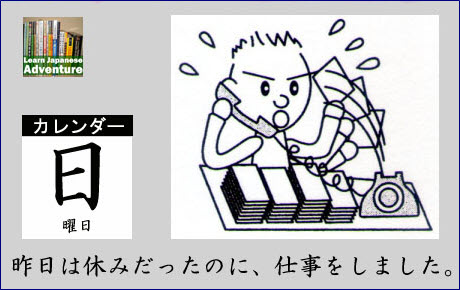- Home
- Intermediate Lessons
- Japanese Grammar noni
Japanese Grammar noni のに -
Intermediate Lessons: 36
のに noni is used when what is stated in the second sentence runs against to what is expected from the first sentence.

The second sentence carries the implication of unexpectedness or dissatisfaction and it's often used for complaint.
Sentence Patterns
Let's check out the sentence patterns of this grammar のに (noni). Just like ので (node), のに (noni) follows verbs, adjectives or nouns.
| Sentence 1 のに | Sentence 2 (Contrary Result) |
| Verb plain-form のに | Contrary Result |
| い-adj plain-form のに | Contrary Result |
| な-adj plain-form(~ |
Contrary Result |
| Noun plain-form(~ |
Contrary Result |
Note: Non-factual sentence like an intention, an order, a request, a permission or a suggestion cannot be used in the second sentence.
Let's look at some examples...
|
1. |
約束をしたのに、彼女は来ませんでした。 |
|
2. |
今日は祝日なのに、働かなければなりません。 |
In example 1, the speaker expects that the woman will come because she promised to do so. So he naturally feels disappointed that she did not come.
In example 2, Holiday is normally a rest day, yet the speaker has to work so he feels dissatisfied. The second sentence implies feelings of unexpectedness or dissatisfaction.
Difference between ~ので and ~のに
ので (node) indicates the cause or reason of certain event while のに (noni) shows the contrary result.
Let's use some examples to show how the result changed using either ので (node) or のに (noni).
|
1. |
今日は暑いので、T-シャツを着ています。 |
|
2. |
昨日は休みだったので、一日中寝ました。 |
|
3. |
来週テストがあるので、弟は一生懸命勉強しています。 |
|
4. |
ダイエットをしたので、痩せました。 |
|
5. |
日本語を十年勉強したので、日本語が上手です。 |
In example 1, normally when it's hot, you'll wear something thin like a T-shirt. But for のに's case, you wear something thick like a sweater, showing unexpected contrary result.
In example 2, you rest because it's your rest day. But for のに's case, you went to work instead, showing your unsatisfied feeling.
The rest of the examples also show the unexpected or dissatisfied contrary results in のに's cases.
Difference between ~のに and ~が/~ても
When translating のに (noni) into English, you can simply use the word "but".
There are some other terms which also carry the meaning of "but", like for example, が (ga) and ても (temo). However, they are being used in different situations.
| が (ga): | Fact |
| ても (temo): | Possibility (you can have contrary result) |
| のに (noni): | Fact (contrary result with surprising or unsatisfied feeling) |
Let's use some examples to show the difference between ~のに and ~が/~ても.
|
1. |
私の部屋は狭いですが、きれいです。 |
|
2. |
明日雨が降っても、出かけます。 |
が (ga) in example 1 above cannot be substituted with のに (noni) - "狭いのに".
This is because が (ga) simply joins two different evaluations together and the second sentence therein does not represent an unexpected consequence of what is stated in the first sentence.
Similary, ても (temo) in example 2 cannot be replaced by のに (noni) - "雨が降るのに", the first sentence suggests a possibility, but のに (noni) can only indicate things that have actually occurred in reality (fact).
Let's look at another example.
- 約束をしたのに、どうして来なかったんですか。
yakusoku wo shita noni, doushite konakattan desu ka
Meaning: You promised to come. Why didn't you come?
In the above example, のに (noni) cannot be substituted with が (ga) or ても (temo) - "約束をしましたが" / "約束をしても". This is because the second sentence expresses a strong reproach (dissatisfaction).
Practice using が, ても and のに
Let's practise on connecting the following sentences using either が (ga), ても (temo) or のに (noni). Some of the examples might be able to use more than one of them to connect the two sentences.
|
1. |
この部屋は広いです。暗いです。 |
|
2. |
明日雨が降ります。サッカーをします。 |
|
3. |
姉は沢山食べます。太りません。 |
|
4. |
昨日うるさかったです。よく寝られました。 |
|
5. |
来年お金がありません。日本へ行きましょう。 |
|
6. |
すみません。トイレはどこですか。 |
Have you figured out which one (or more) to use to connect the sentences? Below are my answers and the explanation on why which one was used (or not used).
Example 1
- この部屋は広いですが、暗いです。
kono heya wa hiroi desu ga. kurai desu
Meaning: This room is spacious but dark.
In example 1, we are using が (ga) to join two different evaluations together. There's no relationship between the two. Only that one is positive meaning (広い) and the other is negative meaning (暗い).
You cannot connect them using ても (temo) or のに (noni) because the second sentence does not contain contrary result of what is expected.
Example 2
- 明日雨が降っても、サッカーをします。
ashita ame ga futtemo, sakka- wo shimasu
Meaning: Even if it rains tomorrow, I will play soccer.
In example 2, it's not a fact but only a possibility which may happen tomorrow. Therefore only ても (temo) can be used in this case.
Example 3
- 姉は沢山食べますが、太りません。
ane wa takusan tabemasu ga, futorimasen
Meaning: My elder sister eats a lot, but she doesn't get fat.
姉は沢山食べても、太りません。
ane wa takusan tabetemo, futorimasen
Meaning: Even if my elder sister eats a lot, she doesn't get fat.
姉は沢山食べるのに、太りません。
ane wa takusan taberu noni, futorimasen
Meaning: Even though my elder sister eats a lot, she doesn't get fat.
が (ga), ても (temo) and のに (noni) can all be used in example 3. However, there are slight differences in terms of the meaning of each sentence, especially the feeling of the speaker.
When using が (ga), you are just describing the fact about your elder sister that she eats a lot but never get fat. There's no personal feeling when you say that.
When ても (temo) is used, you are saying that your elder doesn't usually eat a lot but even if she eats a lot, she won't get fat. You are talking about the possibility.
If のに (noni) is used instead, you are saying that even though your elder sister eats a lot, she never get fat (with some dissatisfied feeling).
Probably you are jealous with your elder sister since you gain weight easily even if you eat a little. You are feeling some unfairness.
Example 4
- 昨日うるさかったですが、よく寝られました。
kinou urusakatta desu ga, yoku neraremashita
Meaning: It was noisy yesterday, but I could sleep well.
昨日うるさかったのに、よく寝られました。
kinou urusakatta noni, yoku neraremashita
Meaning: Even though it was noisy yesterday, I could sleep well.
Example 4 is a past event on yesterday. Therefore ても (temo) sentence (possibility) cannot be used.
For the sentence using が (ga), you are just describing the fact that you could sleep well although it was noisy yesterday. There is no personal feeling.
For sentence using のに (noni), there is a surprising feeling. You are amazed that you are not sensitive to the noise and could sleep well yesterday.
Example 5
- 来年お金がなくても、日本へ行きましょう。
rainen okane ga nakutemo, nihon e ikimashou
Meaning: Even if we don't have money next year, let's go to Japan.
The event for example 5 may happen in next year which mean it's only a possibility. Therefore only ても (temo) sentence can be used.
Example 6
- すみませんが、トイレはどこですか。
sumimasen ga, toire wa doko desu ka
Meaning: Excuse me, where is the toilet?
In example 6, the が (ga) here is introduction no が (ga), which works as an introduction before you bring out the actual thing you want to say. ても (temo) and のに (noni) cannot be used here.
Related Pages
Lesson 14: Introduction no が (ga).
Lesson 20: Japanese Grammar for Cause and Reason ので (node) Sentence.
Lesson 25: ても (temo) Sentence.
Take The Challenge Sales! Get 45% OFF Premium & Premium PLUS! Ends on 16 Jan 2026
Click Here to Get 45% OFF Premium & Premium PLUS and be on the fast track to fluency in Japanese.
The link above is an affiliate link, which means that I would earn a commission (at no extra cost to you) if you do end up purchasing the related learning course.
Previous - Lesson 35: te-form for Cause or Reason
Buy me a coffee








Facebook Comments
Don’t see the comments box? Log in to your Facebook account, give Facebook consent, then return to this page and refresh it.